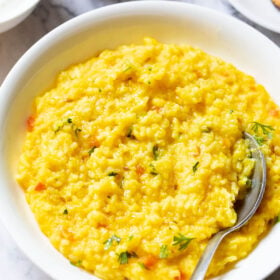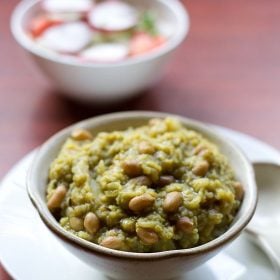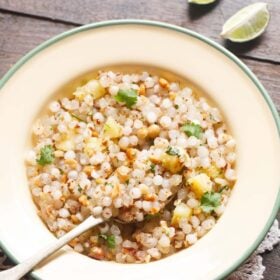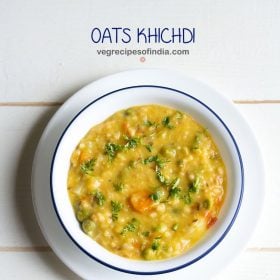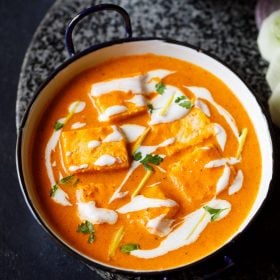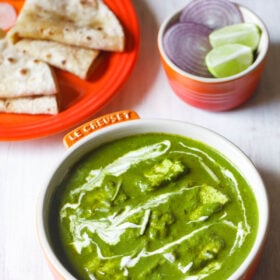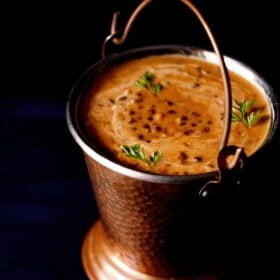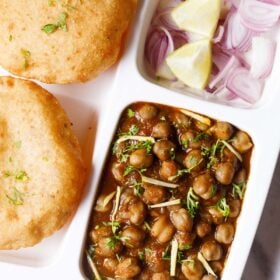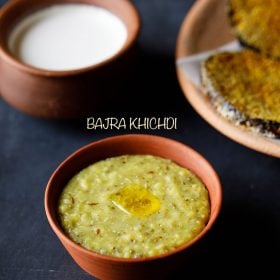Cozy, comforting, and warming to the body and soul, my simple family recipe for Bajre ki Khichdi or Pearl Millet Khichdi is a must-make during cold weather. It is also a one-pot meal, made with Pearl Millet (Bajra in Hindi) and mung beans (moong dal), this nutritious meal is perfect for bolstering your immune system during cold winters.
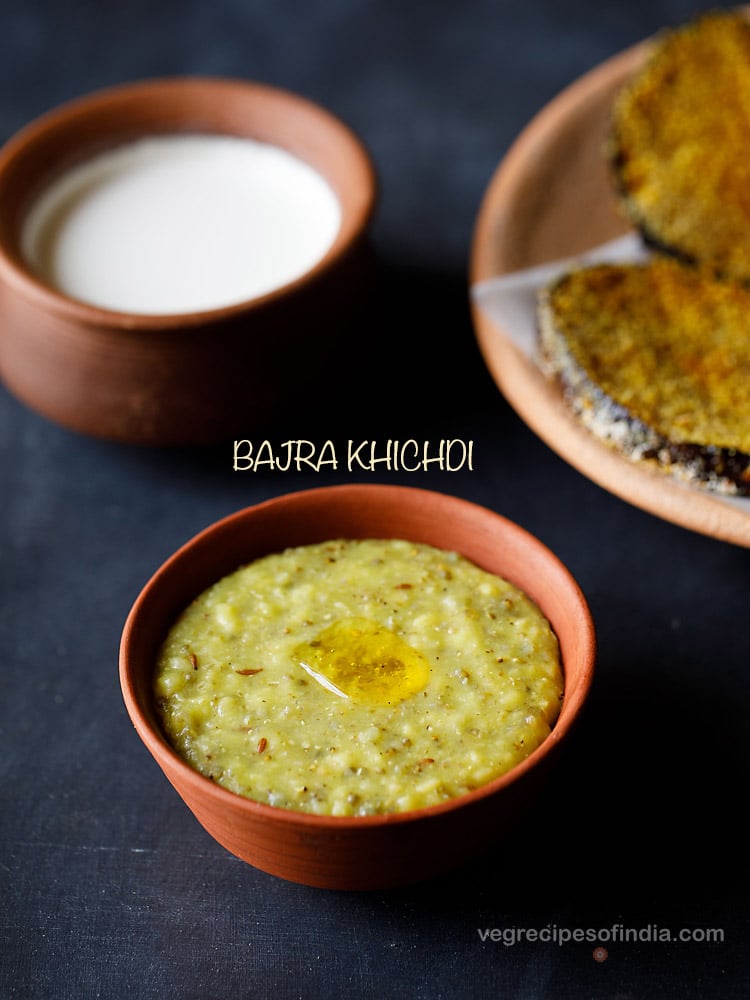
About Bajre ki Khichdi Recipe
Bajra Khichdi is a warming and nutritious lentil porridge that is a staple food in the regions of Rajasthan, Haryana and some parts of North India. It is often made during the winters since bajra is considered heaty, or garam, in Ayurvedic tradition.
Bajre ki Khichdi is simply delicious, and you will love the slightly chewy texture from the bajra. This recipe can be made vegan, if made with oil instead of ghee; making it ideal for sharing with friends and family.
There are many variations of making Pearl Millet Khichdi. In some variations, rice is added, but not here. It is also free from onion and garlic, making it suitable for Jain vegetarians. That said, you can absolutely add onions if you like!
Table of Contents
In this simple Bajre ki Khichdi recipe only pearl millet and moong lentils are used (no rice), along with a few spices and herbs. In total, you only need 10 ingredients to make this delicious meal.
As if that weren’t enough to love, everything is cooked in one pot, meaning the cleanup is super easy. I also use a pressure cooker to save time while cooking.
You’ll need just 10 minutes of prep time and 20 minutes of cooking time to get this nutrition-packed meal on the table.
Whenever I make the regular staple Moong Dal Khichdi, I like to make some kind of veggie fry to go with it. This time I made Brinjal Fry to serve with Millet Khichdi.
It can also be served with Chaas (Indian Spiced Buttermilk), Rajasthani Kadhi, fresh curd, or a bit of ghee to add some richness. It is also perfectly yummy on its own as a healthy meal.
Ingredients & Substitutions
As promised, you only need 10 simple ingredients to make this tasty bajra khichdi recipe. Here is what to gather:
- Ghee or Oil – Either option will yield a delicious meal. Just be sure to opt for a neutral-flavored oil with a high smoke point.
- Cumin Seeds (Jeera) – For warmth and these fragrant seeds also help in digestion.
- Ginger – Fresh is always best, but in a pinch you can sub in ginger paste or ginger powder.
- Green Chilli – For a touch of heat. Feel free to increase or decrease the amount used based on your tolerance for spicy foods.
- Bajra (Pearl Millet) – While it won’t taste quite the same, you can also use sorghum here or opt to use other kinds of millets like foxtail millet, barnyard millet, browntop millet, little millet and proso millet.
- Turmeric Powder – For warmth and color. If you don’t have any ground turmeric on hand, grate twice as much peeled fresh turmeric root.
- Asafoetida – For allium complexity without any onions or garlic. Please note that many commercially available brands of hing are processed with wheat, so check your labels if you are sensitive to gluten.
- Water – If possible, use filtered water for the best taste.
- Salt – For seasoning.
- Moong Dal – You can also use moong dal with husks (chilkewali moong dal) instead of husked yellow moong dal. In a pinch, you can swap in masoor dal or yellow lentils (tur dal) instead.
How To Make Bajre ki Khichdi
Preparation
1. Take ½ cup bajra (pearl millet) in a mixer-grinder jar.
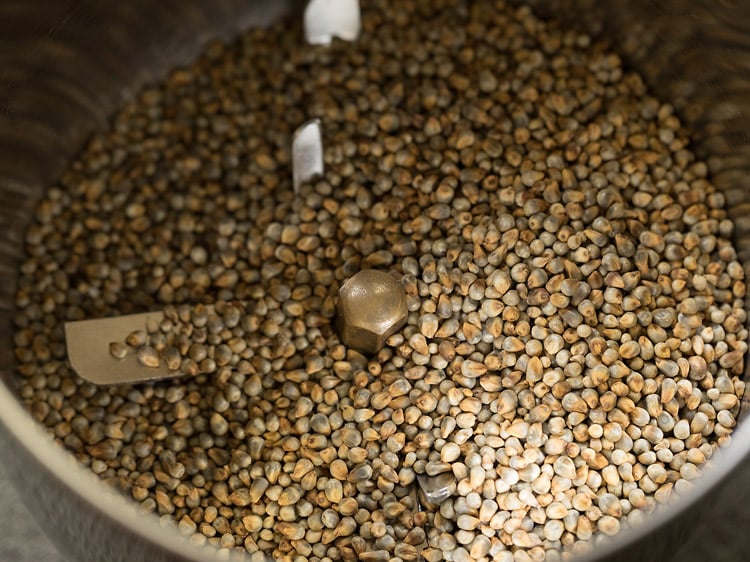
2. Using the pulse option, grind the bajra coarsely. Do not make a powder of it. Some grains will be crushed and some won’t be, but that’s fine. We just need a coarse mixture.
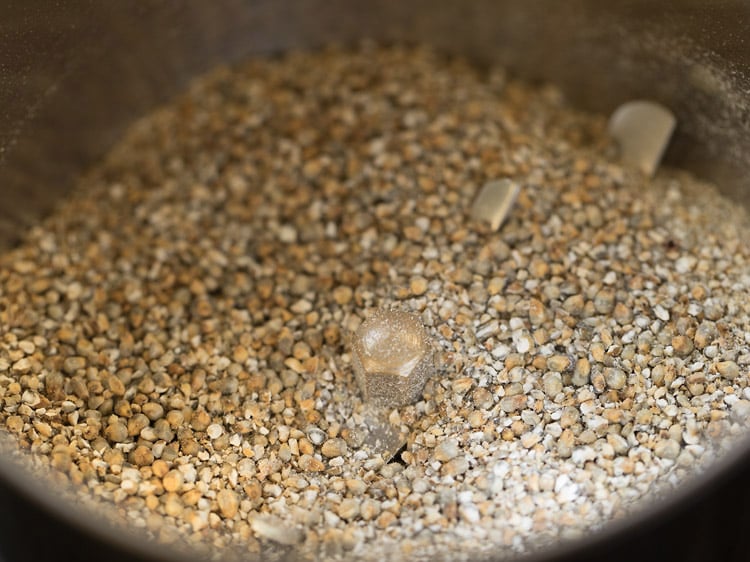
3. Now take the coarsely ground bajra in a bowl. Add water to cover the bajra and stir. Wait for a few seconds.
The fine husk particles will be seen floating on the top of the water. Discard the water slowly from the bowl. Repeat this process 2 to 3 times. Drain all the water and keep aside.
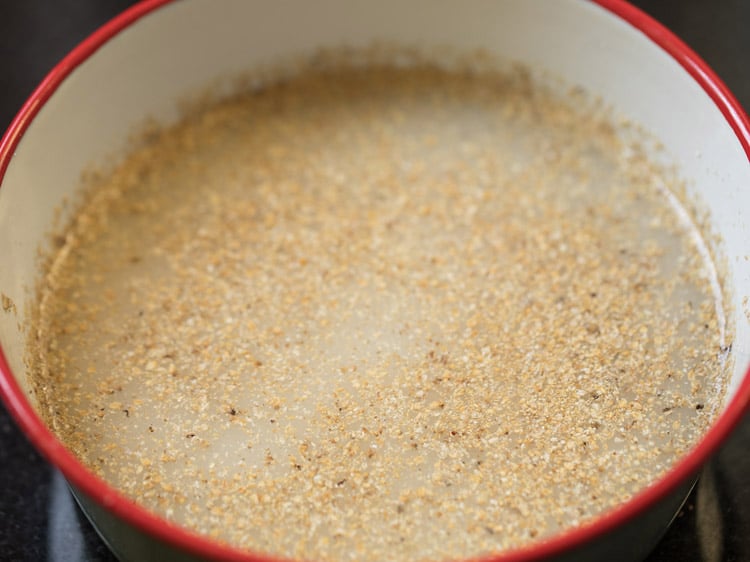
4. In another bowl rinse ½ cup moong dal a couple of times in water. Then soak in enough water.
You can also use moong dal with husks (chilkewali moong dal) instead of husked yellow moong dal.
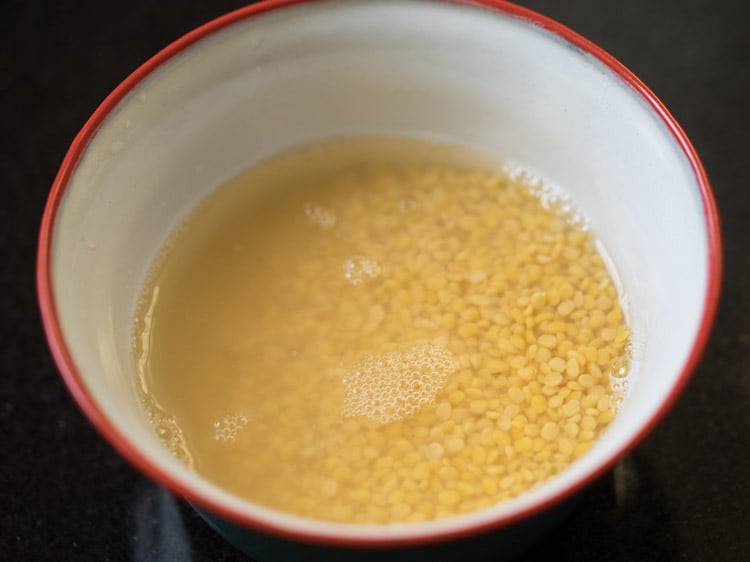
Make Bajra Khichdi
5. Heat 2 tablespoons ghee in a 3 litre pressure cooker. You can use oil instead of ghee. Keep the flame to a low.
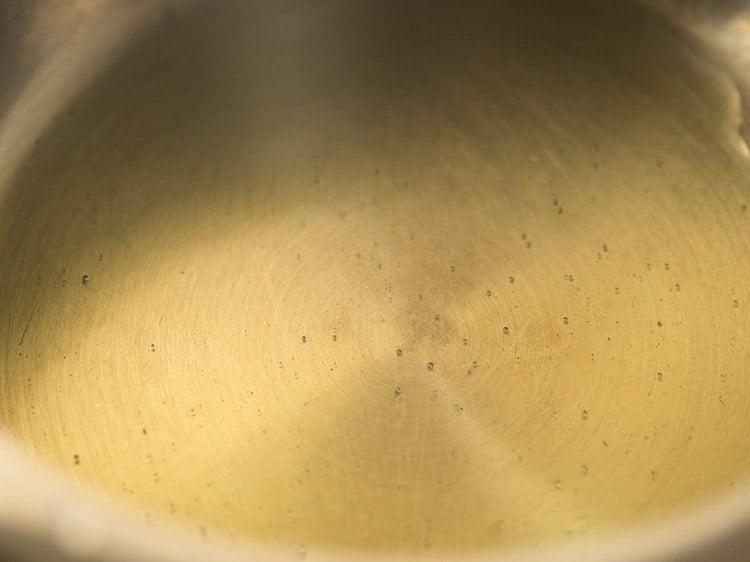
6. Add 1 teaspoon cumin seeds.
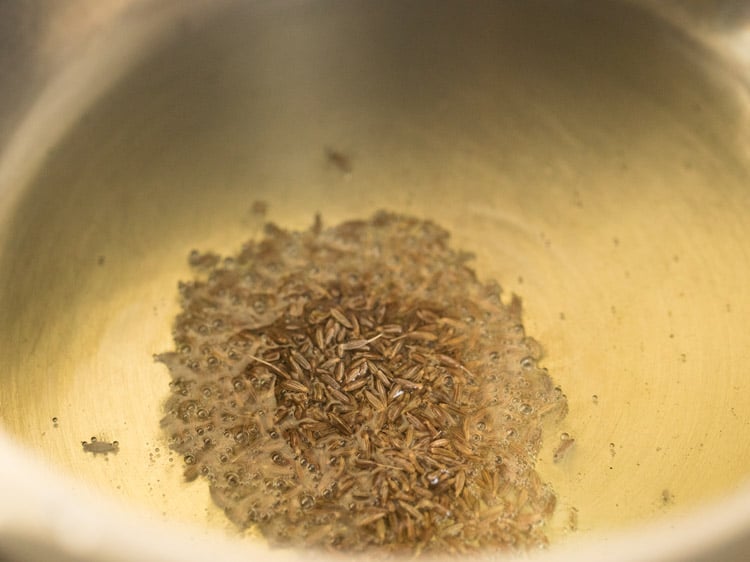
7. Let the cumin seeds splutter.
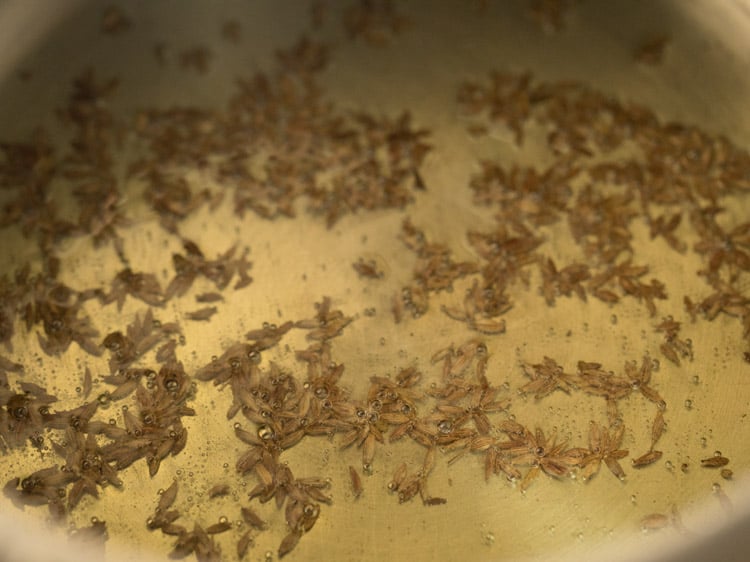
8. Then add 1 teaspoon of finely chopped ginger and 1 chopped green chili.
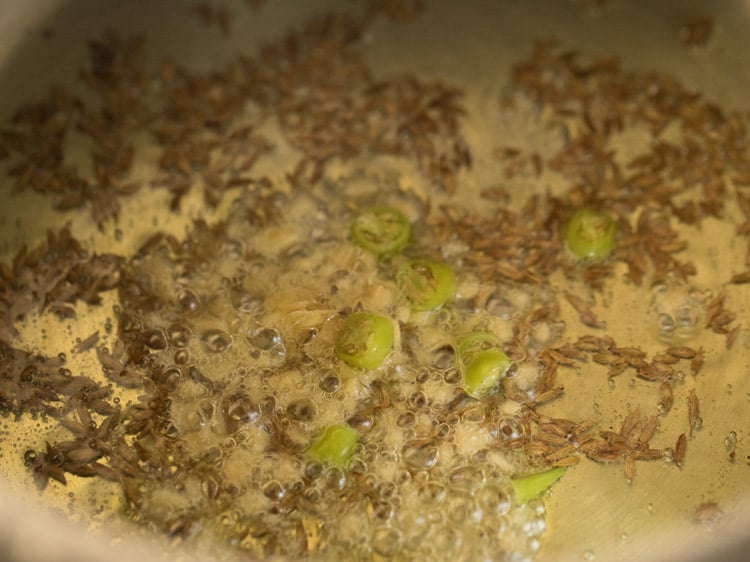
9. Stir and fry for a few seconds till the raw aroma of ginger goes away.
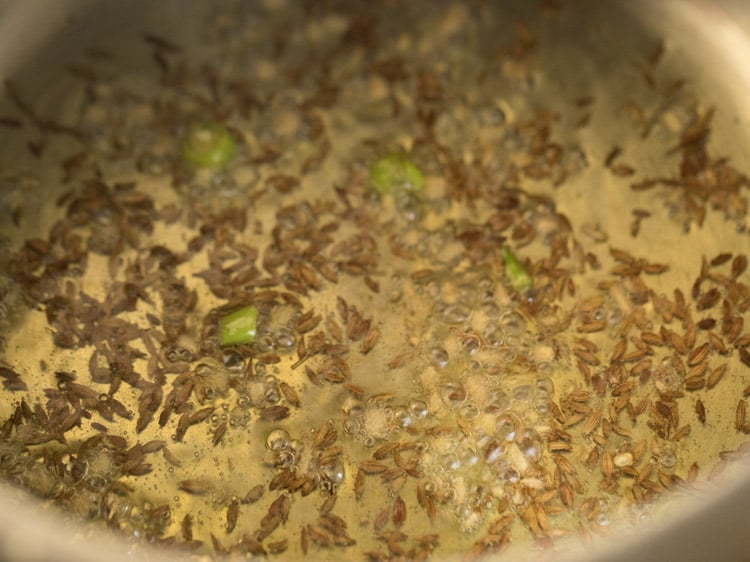
10. Then add the rinsed coarse bajra.
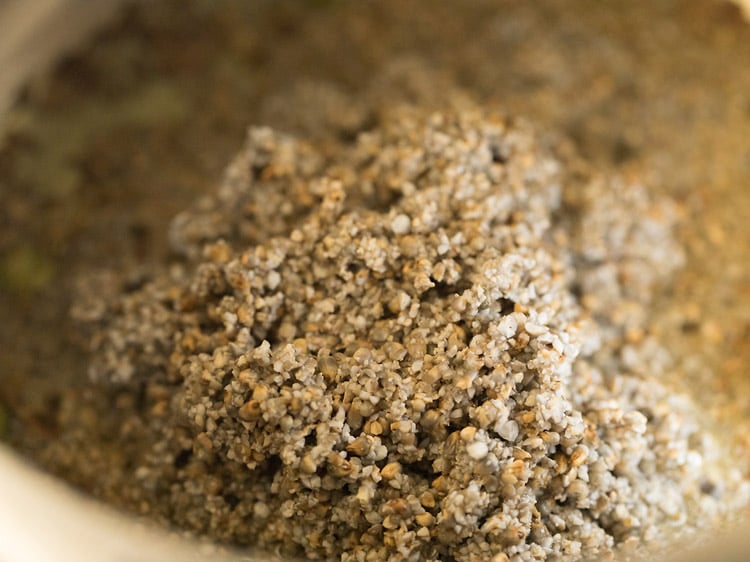
11. Mix the bajra well. Sauté and keep on stirring as the bajra has a tendency to stick to the bottom of the cooker. Keep the heat to a low.
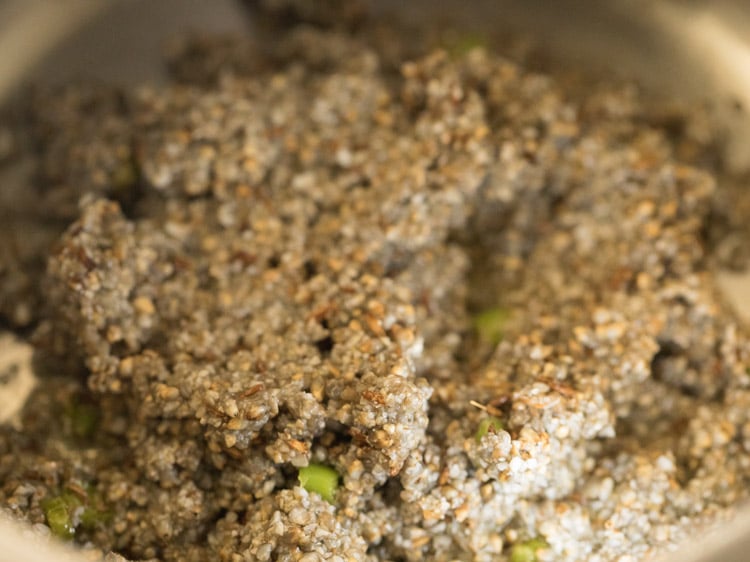
12. Next add ¼ teaspoon turmeric powder and 1 pinch asafoetida (hing). Mix again.
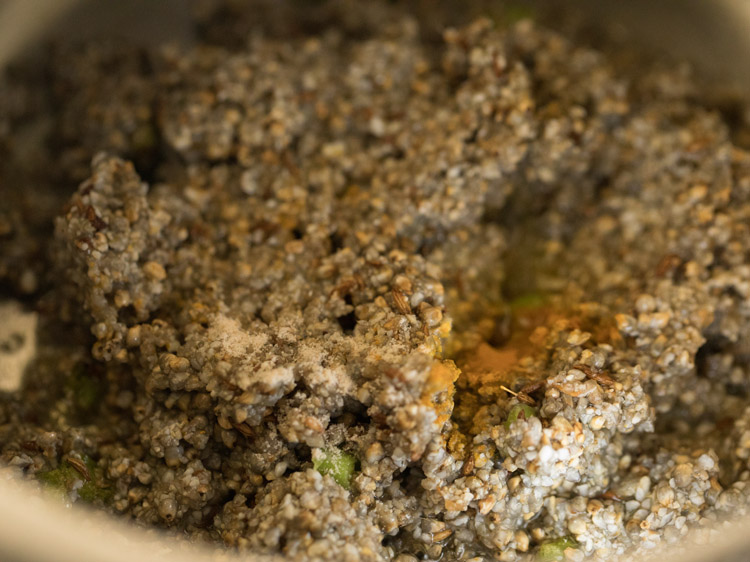
13. Pour in 2 cups of water.
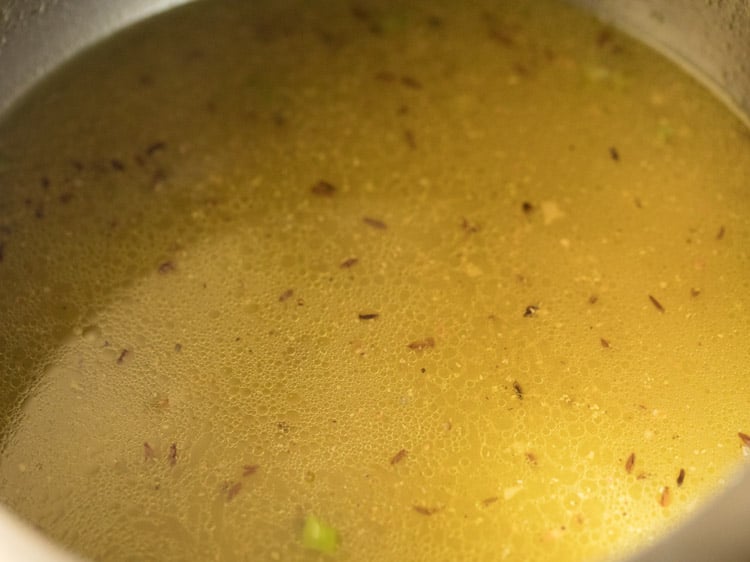
14. Season with salt as per taste.
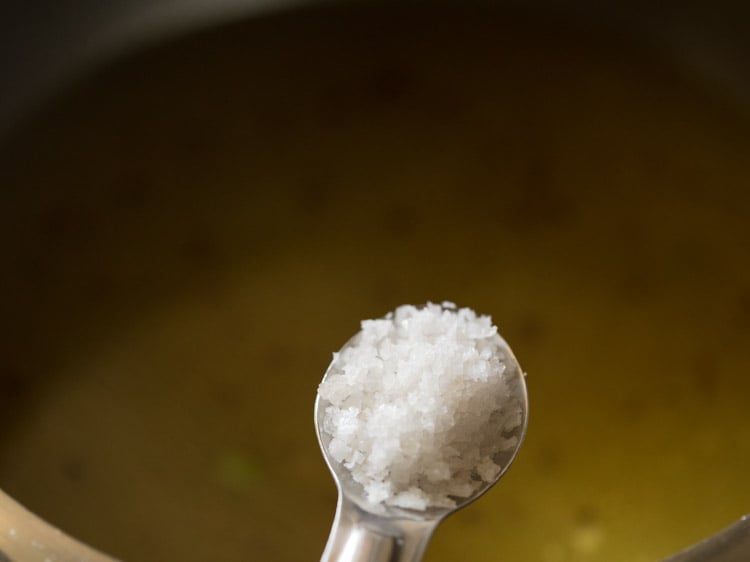
15. Cover and pressure cook for 6 to 7 minutes or for 4 to 5 whistles on medium heat. Turn off heat.
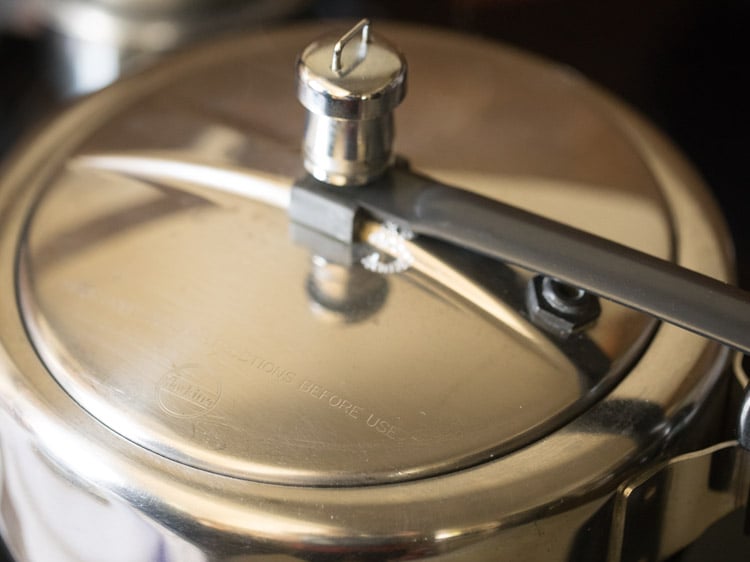
16. When the pressure drops on its own, remove the lid of the cooker.
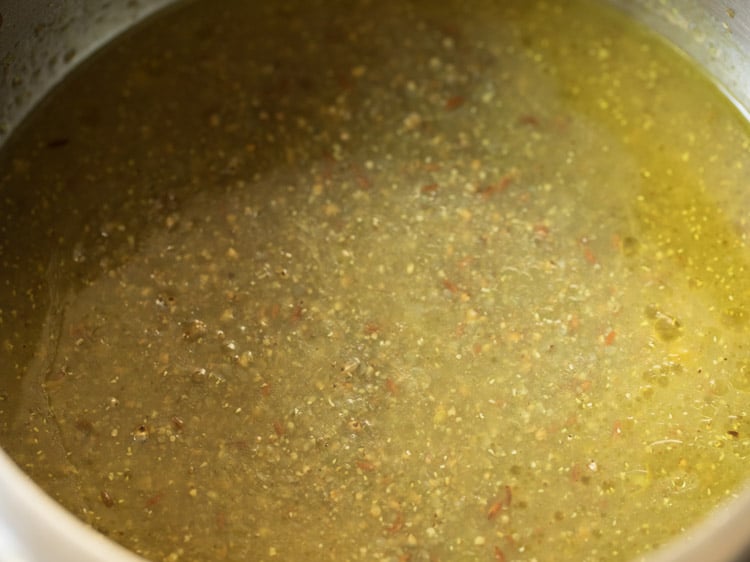
17. Stir the semi cooked bajra mixture very well. The bajra grains will be half-cooked.
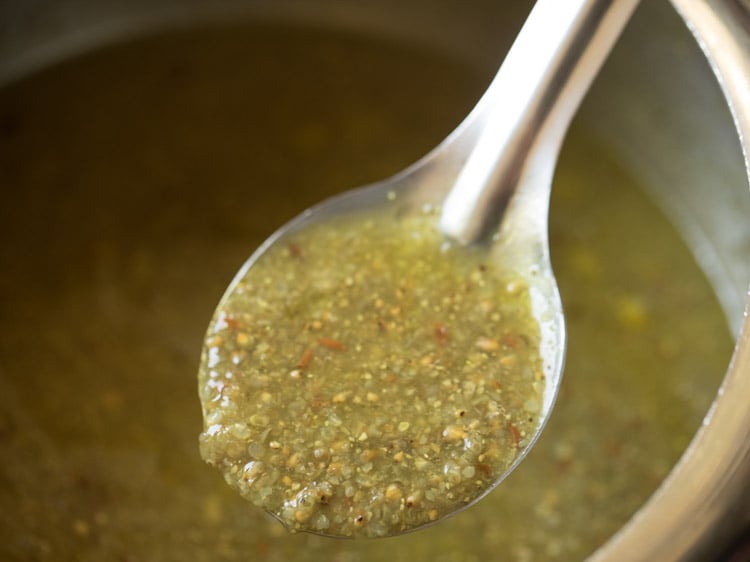
18. Drain all the water from the soaked moong lentils and add to the half-cooked bajra in the pressure cooker.
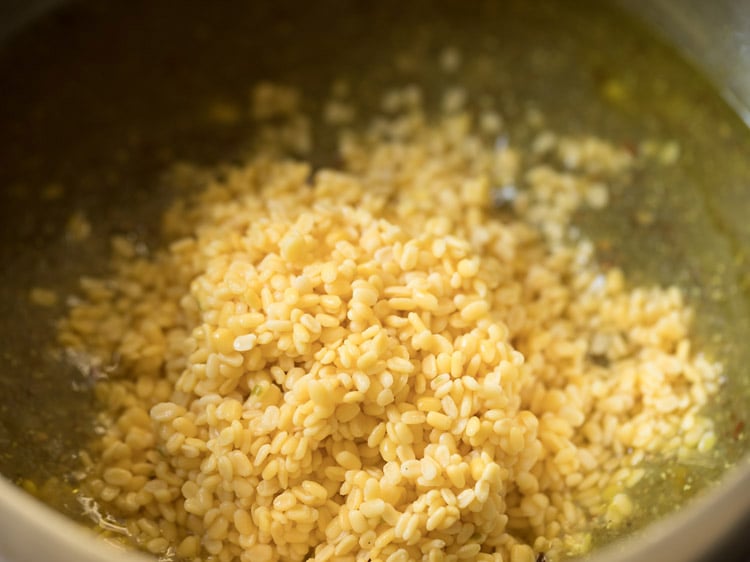
19. Add 2 cups water.
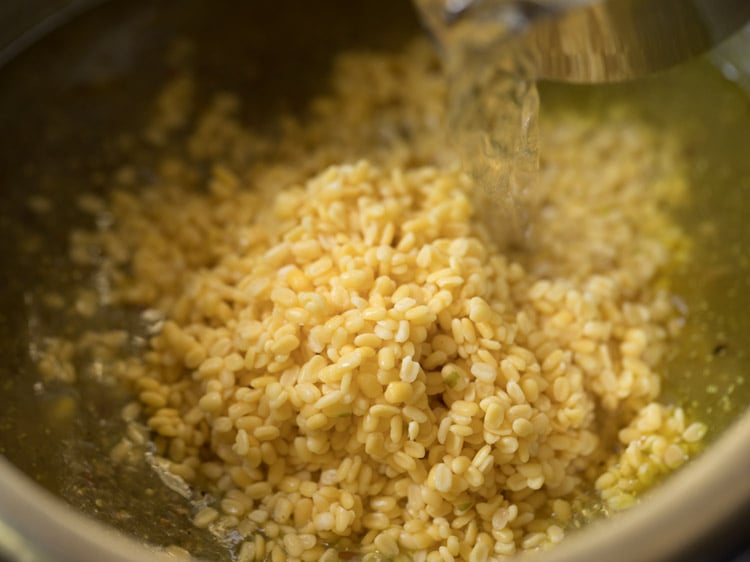
20. Stir and mix very well.
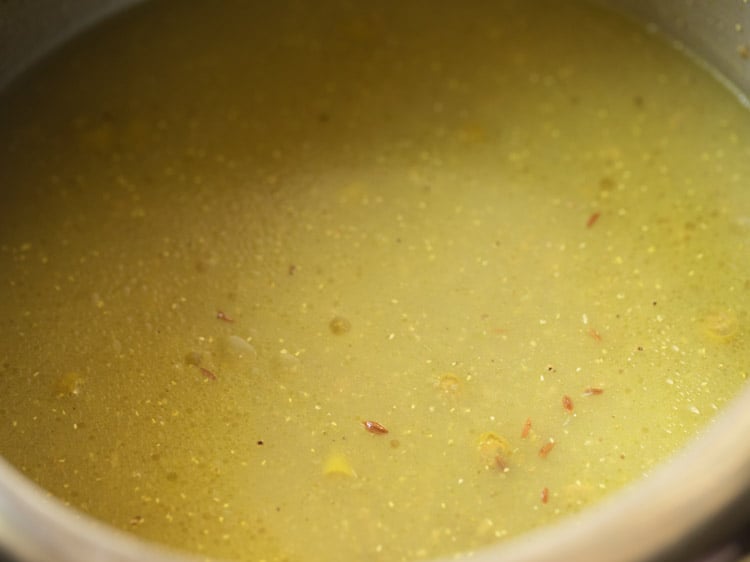
Cook Pearl Millet Khichdi
21. Cover and pressure cook for 8 to 9 minutes (7 to 8 whistles) on medium heat. Turn off heat.
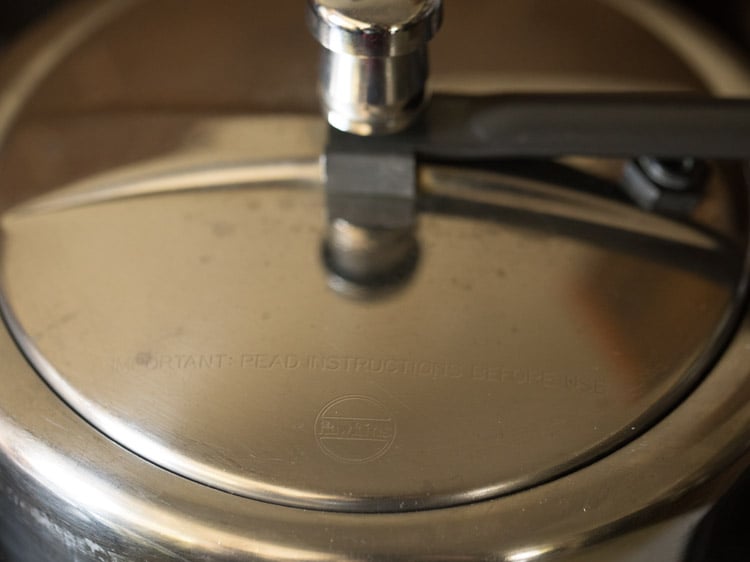
22. When the pressure drops naturally in the cooker, then only open the lid of the cooker.
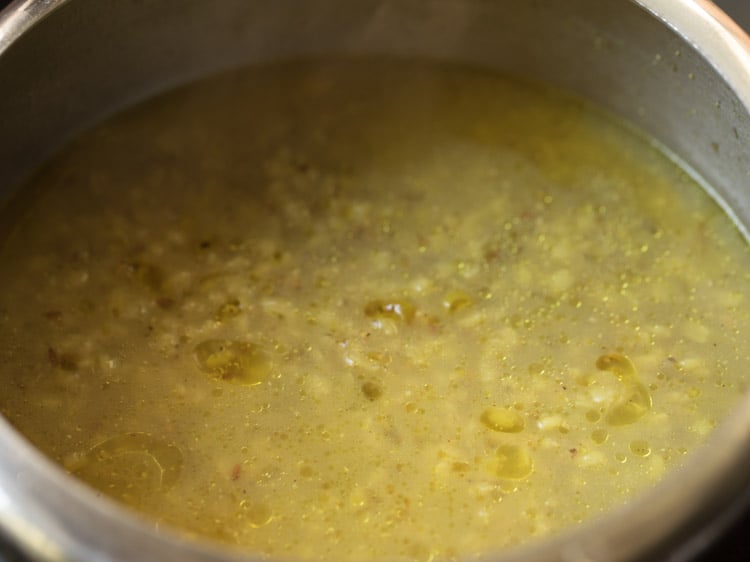
23. Stir again very well. In case if bajre ki khichdi looks thick, then add some more water and simmer on low heat stirring continuously.
Also check the taste for salt and add more if required. At this point you can also add a few pinches of garam masala powder if you prefer.
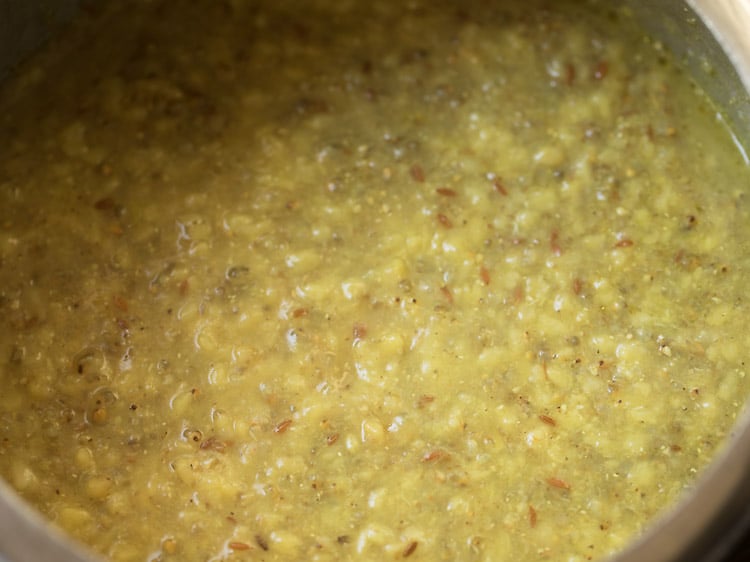
24. Serve Bajre ki Khichdi hot with a side accompaniment of chaas (buttermilk), kadhi or with fresh curd or yogurt. While serving you can garnish with coriander leaves or mint leaves.
You can also top it with a bit of ghee while serving accompanied with roasted papad or masala papad and some pickle. Enjoy!
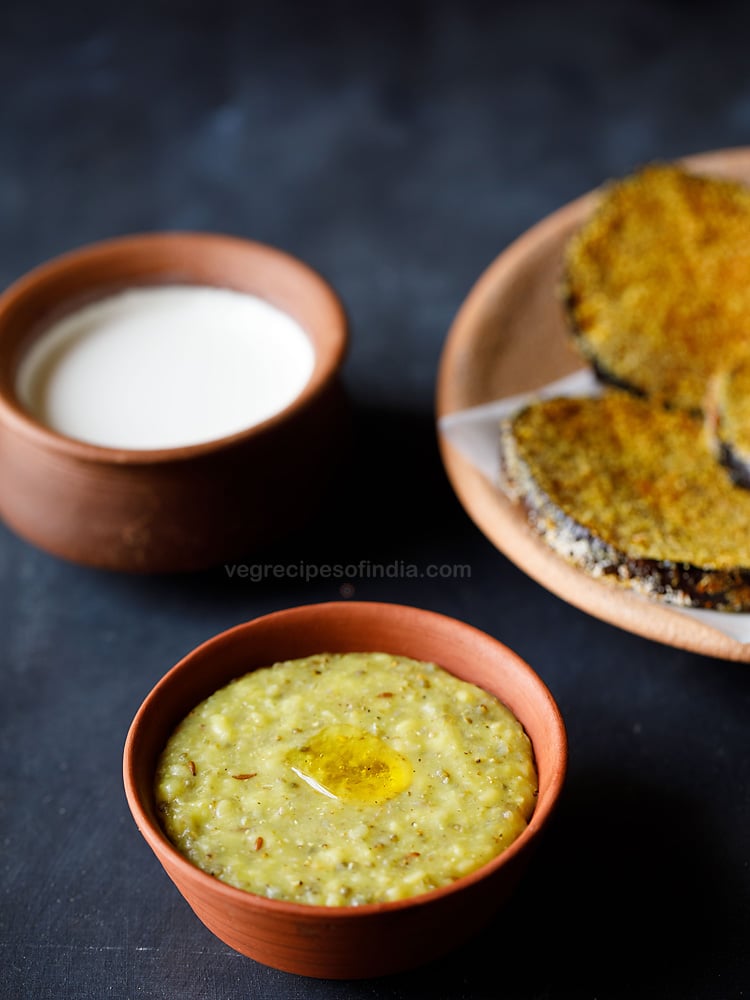
Expert Tips
- Ensure that your bajra or pearl millet is under its shelf-life. If the bajra has gone rancid, it will taste bitter or have an off taste. Bajra has a nice nutty flavor and chewy texture.
- You can opt to use split mung lentils with their green husks to make this bajre ki khichdi. Other lentils that you can add are masoor dal (pink lentils) and tuvar dal (yellow lentils).
- Instead of a stovetop pressure cooker, you can also cook this dish in the Instant Pot adding water as needed.
- Bajra khichdi will thicken as it cools. When serving any leftover khichdi, add some water, bring the khichdi to a simmer, and then serve.
- To make the millet khichdi more nutritious, consider adding some mixed vegetables like carrots, green peas, bell peppers, french beans etc. You can also add onions, tomatoes and more spices (like red chilli powder, coriander powder or garam masala powder) and herbs if you like. Even greens like spinach (palak) can be added.
- Covered leftovers will last for up to 1 day in the refrigerator. The Millet Khichdi will thicken naturally once refrigerated. While reheating, add water as needed and simmer until warm or hot.
- You can opt to flavor the khichdi with onions, tomatoes, garlic and more spices and seasonings if you like. Alternatively for more nutritious meal, add in some chopped veggies.
FAQs
Absolutely!
If the raw bajra and moong dal are cooked together, the bajra won’t get cooked all the way and the moong dal will be overcooked and become lumpy because moong dal cooks faster than bajra.
Also, since the moong dal becomes overcooked and thick, it gets stuck at the bottom of the cooker, causing it to get browned or burnt.
If you don’t want to cook them separately, you can soak bajra overnight and then cook them together.
For soaking, I suggest to grinding the pearl millet first and then soaking the coarsely ground bajra. If you soak first and then grind, then you may get a mixture like bajra batter.
More Khichdi Varieties For You!
Dal (Lentils) & Legumes
Rice Recipes
Navratri & Fasting Recipes
Breakfast Recipes
Please be sure to rate the recipe in the recipe card or leave a comment below if you have made it. For more vegetarian inspirations, Sign Up for my emails or follow me on Instagram, Youtube, Facebook, Pinterest or Twitter.
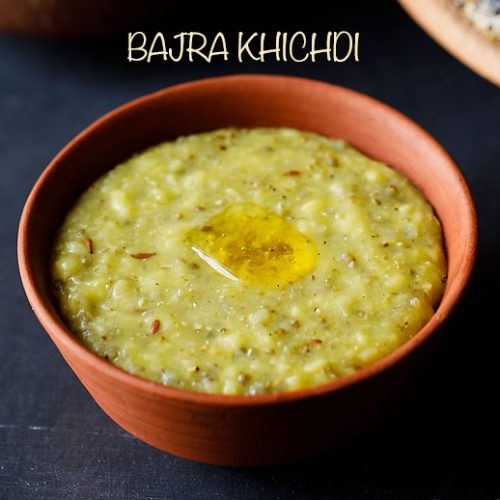
Bajre ki Khichdi Recipe (Pearl Millet Khichdi)
Ingredients
- 2 tablespoons Ghee or oil
- 1 teaspoon cumin seeds
- 1 teaspoon ginger – finely chopped or 1 inch ginger
- 1 green chilli – chopped
- ½ cup bajra (pearl millet)
- ¼ teaspoon turmeric powder (ground tumeric)
- 1 pinch asafoetida (hing)
- 4 cups water
- salt as required
- ½ cup moong dal
Instructions
Preparation
- Take ½ cup bajra (pearl millet) in a grinder jar.
- Using the pulse option grind the bajra coarsely. Do not make a powder of it. Some grains will be crushed and some won’t be. But that is fine. We just need a coarse mixture.
- Now take the coarsely ground bajra in a bowl. Add water and stir. Let the water cover the bajra.
- Wait for some seconds. The fine husk particles will be seen floating on the top of water. Discard the water slowly from the bowl. Repeat this process twice or thrice. Drain all the water and keep aside.
- In another bowl rinse ½ cup moong lentils a couple of times in water. Then soak in enough water. You can also use moong dal with husks (chilkewali moong dal) instead of husked yellow moong dal.
Making pearl millet khichdi
- Heat 2 tablespoons ghee in a 3 litre pressure cooker. You can use oil instead of ghee. Keep the flame to a low.
- Add 1 teaspoon cumin seeds and let them splutter.
- Then add 1 teaspoon finely chopped ginger and 1 green chili, chopped.
- Stir and fry for a few seconds till the raw aroma of ginger goes away.
- Then add the rinsed and coarsely crushed bajra. Mix the bajra well. Keep on stirring as the bajra sticks at the bottom of the cooker. Keep the heat to a low.
- Then add ¼ teaspoon turmeric powder and 1 pinch asafoetida (hing). Mix again.
- Pour 2 cups water and season with salt as per taste.
- Cover and seal with the pressure cooker's lid. Pressure cook for 6 to 7 minutes or for 4 to 5 whistles on medium heat.
- Turn off the heat.
- When the pressure drops naturally on its own, then only remove the lid of the cooker.
- Stir the semi cooked bajra mixture very well. The pearl millet grains will be half cooked.
- Drain all the water from the soaked moong dal and add to the half cooked bajra in the same pressure cooker.
- Add 2 cups water. Stir and mix very well.
Cooking bajra khichdi
- Cover with lid and seal the pressure cooker. Pressure cook for 8 to 9 minutes or for 7 to 8 whistles on medium heat.
- Turn off the heat.
- When the pressure drops on its own naturally, then only open the lid of the cooker.
- Stir again very well. In case if pearl millet khichdi looks thick, then add some more water and simmer on low flame stirring continuously. Also check the taste for salt and add more if needed. At this point you can also add a few pinches of garam masala powder if you prefer.
Serving Suggestions
- Serve Bajre ki Khichdi hot with a side accompaniment of chaas (buttermilk), kadhi or with fresh curd. You can also top it with a bit of ghee while serving.
- Pearl Millet Khichdi will thicken more as it cools. So when serving any leftover khichdi, add some water to it and bring the khichdi to a simmer and then serve.
- Store any leftovers in a covered container for a day in the refrigerator.
Notes
- Make sure to bajra or pearl millet that is under its shelf-life. If the bajra has gone rancid, it will taste bitter or have an off taste.
- You can opt to use split mung lentils with their green husks to make this bajre ki khichdi.
- For a vegan variant, use oil instead of ghee. For a gluten-free option, do not add asafoetida or use asafoetida packaged and marked as gluten-free.
- You can opt to flavor the khichdi with onions, tomatoes, garlic and more spices and seasonings if you like. Alternatively for more nutritious meal, add in some chopped veggies.
- Millet Khichdi will thicken naturally once refrigerated. While reheating, add water as needed and simmer until warm or hot.
- The recipe can be halved or doubled easily.
Nutrition Info (Approximate Values)
This Bajra Khichdi recipe from the archives first published in December 2017 has been updated and republished on October 2023.
